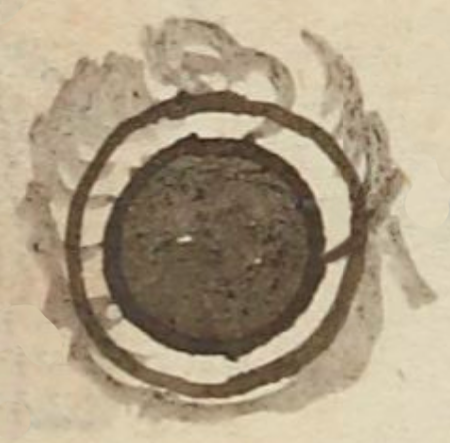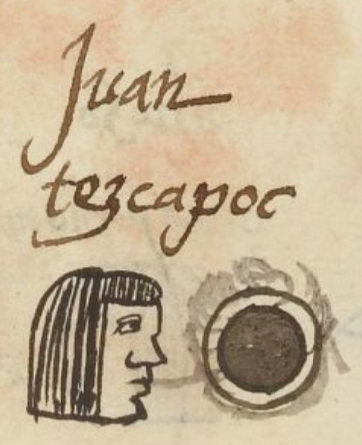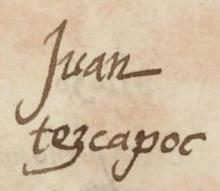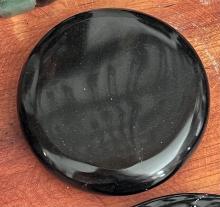Tezcapoc (MH500r)
This black-line drawing of the compound glyph for the personal name Tezcapoc ("The Mirror Smoked," attested here as a man’s name) shows a mirror (tezcatl) surrounded by smoke (poctli). The mirror is circular, with a black center (probably polished obsidian) and a white ring around that. The smoke is painted in a light gray. It does not have the usual curling volutes; it is thinner and less well defined.
Stephanie Wood
This name recalls the divine force or deity name Tezcatlipoca, seemingly pointing to the mirror as a portal to a spiritual world. There was also a phenomenon of a mirror that was used for divining, as supported in the dictionary term, nahualtezcatl.
Having an association with the highest leadership and approved by the divine force called Tezcatlipoca (“The Mirror’s Smoke”) underlines the sacred value of mirrors. See Aztecs/Azteken, an exhibition catalogue, eds. Doris Kurella, Martin Berger and Inés de Castro, at the Linden Museum, Stuttgart; published by Hirmer Publishers of Germany and INAH of Mexico (2019, 309).
One can imagine the obsidian mirror as a tool for starting a fire. A mirror could be an adornment on clothing. It could be a practical or a spiritual way of looking at one's face. In this collection, one will notice that profile views are much favored over frontal views of faces. Perhaps frontal views were perceived to be too direct or too powerful for normal purposes. Looking at rulers, such as Motecuhzoma, in the face was something controlled, too, possibly because of his perceived divinity. Frontal views of faces are often found on glyphs such as teotl (divinity), tonatiuh (sun), tonalli (sun/day), deity sculptures (e.g., nenetl), skulls, and an occasional animal (e.g., especially the tecolotl, or owl, which may have been perceived to have special powers, given that the tlacatecolotl was a supernatural being). Specifically "face" (xayacatl) glyphs are sometimes given in a frontal view, too.
Stephanie Wood
Juan
tezcapoc
Juan Tezcapoc
Stephanie Wood
1560
Jeff Haskett-Wood
mirrors, espejos, smoke, humo
This highly polished contemporary obsidian mirror was being offered for sale in a shop outside the Guachimontones archaeological site. Photo by S. Wood, 16 April 2025.

tezca(tl), mirror, https://nahuatl.wired-humanities.org/content/tezcatl
poc(tli), smoke (the noun), https://nahuatl.wired-humanities.org/content/poctli
Tezcapoc, a personal name, https://nahuatl.wired-humanities.org/content/tezcapoc
nahualtezca(tl), a mirror used for divining, https://nahuatl.wired-humanities.org/content/nahualtezcatl
Espejo-Humo
Stephanie Wood
Matrícula de Huexotzinco, folio 500r, World Digital Library, https://www.loc.gov/resource/gdcwdl.wdl_15282/?sp=79&st=image
This manuscript is hosted by the Library of Congress and the World Digital Library; used here with the Creative Commons, “Attribution-NonCommercial-ShareAlike 3.0 License” (CC-BY-NC-SAq 3.0).





